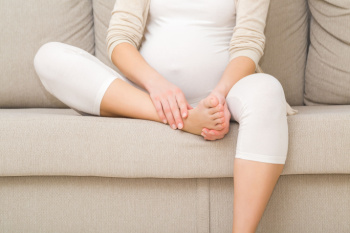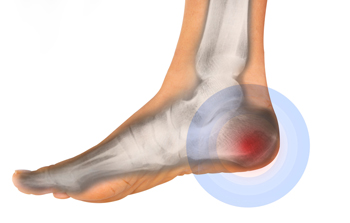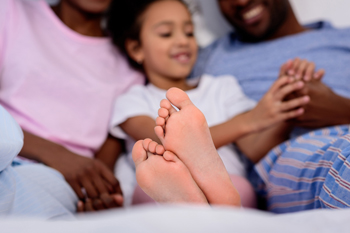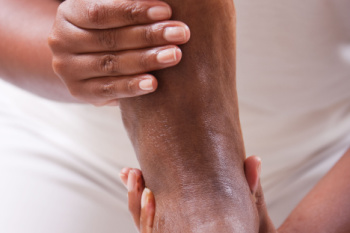Items filtered by date: February 2025
Do You Suffer From Painful Feet?
The Connection Between Pregnancy and Athlete’s Foot

Athlete's foot is a common fungal infection that affects the skin on the feet. During pregnancy, hormonal changes can increase the likelihood of developing athlete's foot. Hormones such as progesterone cause changes in sweat production, leading to a warmer and more humid environment in the shoes, which is ideal for fungal growth. Poor foot hygiene during pregnancy can also contribute to this condition. As pregnancy progresses, some women may struggle to maintain proper foot care, leading to an increased risk of infections. Additionally, staying barefoot too much can expose the feet to the fungi responsible for athlete's foot, as bare feet are more susceptible to infections in public areas like swimming pool or gym locker rooms. If you are pregnant and have developed athlete’s foot, it is suggested that you consult a podiatrist who can effectively treat this uncomfortable condition.
Pregnant women with swollen feet can be treated with a variety of different methods that are readily available. For more information about other cures for swollen feet during pregnancy, consult with Charles Perry, DPM from Ohio. Our doctor will attend to all of your foot and ankle needs.
What Foot Problems Can Arise During Pregnancy?
One problem that can occur is overpronation, which occurs when the arch of the foot flattens and tends to roll inward. This can cause pain and discomfort in your heels while you’re walking or even just standing up, trying to support your baby.
Another problem is edema, or swelling in the extremities. This often affects the feet during pregnancy but tends to occur in the later stages.
How Can I Keep My Feet Healthy During Pregnancy?
- Wearing orthotics can provide extra support for the feet and help distribute weight evenly
- Minimize the amount of time spent walking barefoot
- Wear shoes with good arch support
- Wear shoes that allow for good circulation to the feet
- Elevate feet if you experience swelling
- Massage your feet
- Get regular, light exercise, such as walking, to promote blood circulation to the feet
If you have any questions please feel free to contact our offices located in Cambridge and Zanesville, OH . We offer the newest diagnostic and treatment technologies for all your foot and ankle needs.
Reasons for Heel Pain After Running

Heel pain after running is a common complaint among runners and can stem from various foot conditions. Plantar fasciitis, one of the leading causes of heel pain after running, occurs when the thick tissue on the bottom of the foot becomes strained from repetitive impact. Other potential sources of heel pain are Achilles tendinitis, stress fractures, or heel spurs, which may develop due to excessive strain on the heel. Running on hard surfaces, wearing improper footwear, or sudden increases in training intensity can contribute to the problem. Symptoms include sharp pain in the heel, stiffness in the ankle, and tenderness along the arch or Achilles tendon. If left untreated, the heel pain can worsen, making daily activities like standing and walking more difficult. A podiatrist can evaluate the underlying cause of heel pain, recommend treatment to relieve discomfort, and offer guidance on proper footwear and running techniques to reduce strain on the feet. If you experience heel pain after running, it is suggested that you schedule an appointment with a podiatrist for an exam and appropriate treatment.
Many people suffer from bouts of heel pain. For more information, contact Charles Perry, DPM of Ohio. Our doctor can provide the care you need to keep you pain-free and on your feet.
Causes of Heel Pain
Heel pain is often associated with plantar fasciitis. The plantar fascia is a band of tissues that extends along the bottom of the foot. A rip or tear in this ligament can cause inflammation of the tissue.
Achilles tendonitis is another cause of heel pain. Inflammation of the Achilles tendon will cause pain from fractures and muscle tearing. Lack of flexibility is also another symptom.
Heel spurs are another cause of pain. When the tissues of the plantar fascia undergo a great deal of stress, it can lead to ligament separation from the heel bone, causing heel spurs.
Why Might Heel Pain Occur?
- Wearing ill-fitting shoes
- Wearing non-supportive shoes
- Weight change
- Excessive running
Treatments
Heel pain should be treated as soon as possible for immediate results. Keeping your feet in a stress-free environment will help. If you suffer from Achilles tendonitis or plantar fasciitis, applying ice will reduce the swelling. Stretching before an exercise like running will help the muscles. Using all these tips will help make heel pain a condition of the past.
If you have any questions please contact our offices located in Cambridge and Zanesville, OH . We offer the newest diagnostic and treatment technologies for all your foot and ankle needs.
Causes of Cracked Heels in Children

Cracked heels in children can be an uncomfortable condition that may lead to pain and irritation. Several factors contribute to this issue, with dry skin being one of the primary causes. When the skin on the feet becomes too dry, it loses its elasticity, which can cause cracking, particularly around the heel area. In some cases, an underlying pathological phenomenon, such as eczema or psoriasis, may also contribute to cracked heels. These conditions can cause skin inflammation and dryness, increasing the likelihood of heel cracks. Additionally, footwear that does not provide adequate support can put pressure on the heels and cause them to become dry and cracked. Poor foot hygiene or standing for long periods of time can also worsen the condition. Maintaining good foot care, using moisturizers, and ensuring children wear well-fitting shoes can help prevent and treat cracked heels. If the condition persists, it is suggested that you consult a podiatrist who can effectively treat cracked heels, which may include prescribed medication.
Cracked heels are unsightly and can cause further damage to your shoes and feet. If you have any concerns, contact Charles Perry, DPM from Ohio. Our doctor can provide the care you need to keep you pain-free and on your feet.
Cracked Heels
Cracked heels appear unappealing and can make it harder for you walk around in sandals. Aside from looking unpleasant, cracked heels can also tear stockings, socks, and wear out your shoes. There are several methods to help restore a cracked heel and prevent further damage.
How Do You Get Them?
Dry skin is the number one culprit in creating cracked heels. Many athletes, walkers, joggers, and even swimmers suffer from cracked heels. Age and skin oil production play a role to getting cracked heels as well.
Promote Healing
Over the counter medicines can help, especially for those that need instant relief or who suffer from chronic dry feet.
Wear Socks – Wearing socks with medicated creams helps lock in moisture.
Moisturizers – Applying both day and night will help alleviate dryness which causes cracking.
Pumice Stones – These exfoliate and remove dead skin, which allows for smoother moisturizer application and better absorption into the skin.
Change in Diet
Eating healthy with a well-balanced diet will give the skin a fresh and radiant look. Your body responds to the kinds of food you ingest. Omega-3 fatty acids and zinc supplements can also revitalize skin tissue.
Most importantly, seek professional help if unsure how to proceed in treating cracked heels. A podiatrist will help you with any questions or information needed.
If you have any questions, please feel free to contact our offices located in Cambridge and Zanesville, OH . We offer the newest diagnostic and treatment technologies for all your foot care needs.
Good Foot Hygiene is Key to Healthy Feet

Maintaining proper foot hygiene is essential for overall foot health. Daily washing with soap and warm water removes dirt, bacteria, and sweat, preventing unpleasant odors and infections like athlete’s foot. Thoroughly drying feet, especially between the toes, reduces moisture that can encourage fungal growth. Regularly trimming toenails straight across prevents ingrown nails, while moisturizing keeps skin soft and prevents cracks that could invite infection. Wearing clean socks and breathable shoes minimizes the risk of bacterial buildup and blister formation. Inspecting your feet regularly helps detect issues like cuts, swelling, or discoloration early. Good foot hygiene is especially critical for people with diabetes or poor circulation to avoid serious complications. If problems like persistent pain, wounds, or if infections occur, it is suggested that you consult a podiatrist for professional care and tailored treatment.
Everyday foot care is very important to prevent infection and other foot ailments. If you need your feet checked, contact Charles Perry, DPM from Ohio. Our doctor can provide the care you need to keep you pain-free and on your feet.
Everyday Foot Care
Often, people take care of their bodies, face and hair more so than they do for their feet. But the feet are a very important aspect of our bodies, and one that we should pay more attention to. Without our feet, we would not be able to perform most daily tasks.
It is best to check your feet regularly to make sure there are no new bruises or cuts that you may not have noticed before. For dry feet, moisturizer can easily be a remedy and can be applied as often as necessary to the affected areas. Wearing shoes that fit well can also help you maintain good foot health, as well as making it easier to walk and do daily activities without the stress or pain of ill-fitting shoes, high heels, or even flip flops. Wearing clean socks with closed shoes is important to ensure that sweat and bacteria do not accumulate within the shoe. Clean socks help to prevent Athlete’s foot, fungi problems, bad odors, and can absorb sweat.
If you have any questions please feel free to contact our offices located in Cambridge and Zanesville, OH . We offer the newest diagnostic and treatment technologies for all your foot and ankle needs.

